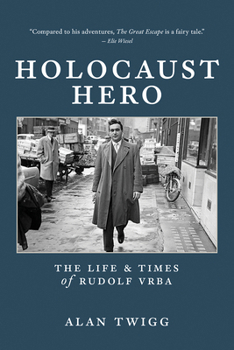Holocaust Hero: The Life and Times of Rudolf Vrba
"His story was breath-taking. He had what's described as a photographic memory. He was able to give eyewitness testimony that was unshakable and he played a key role in the Ernst] Zundel conviction. He was able to tell the story with such clarity that people were able to understand the Holocaust. He remembered the languages that the prisoners] spoke and he knew how many could be crammed into a railroad car."
-- Bernie M. Farber, CEO, Canadian Jewish Congress, 2006
Holocaust scholar Raul Hilberg declared there were only two great Holocaust heroes -- the leader of the Warsaw Ghetto Uprising (Mordechai Anielewicz) and Rudolf Vrba. After he escaped from Auschwitz-Birkenau in April of 1944, Vrba and his co-escapee Alfr d Wetzler co-authored the Vrba-Wetzler Report, credited with saving 200,000 Hungarian Jews. "No other single act in the Second World War," according to World War II historian Sir Martin Gilbert, "saved so many Jews from the fate that Hitler and the SS had determined for them."
As one of the 20th century's most important whistleblowers, Vrba also stands out in Claude Lanzmann's Shoah as a handsome, charismatic and cheerful iconoclast. But the Yad Vashem Holocaust Museum in Israel has limited public awareness of Vrba because he consistently criticized Jewish leaders for failing to adequately forewarn Jews of their fate.
Holocaust Hero: The Life and Times of Rudolf Vrba is the introductory volume for a biography project to examine the remarkable life of Rudolf Vrba; including his decorated service with the partisans, his love affairs, his two marriages, his accomplishments as a Nazi hunter and his iconoclastic stamina to always speak the truth about the Holocaust.
Compiled over a five-year period by a journalist who knew Vrba, Holocaust Hero provides previously unrevealed information about Vrba based on research at the FDR Presidential Library in New York and interviews with those who knew him, including Robin Vrba, his wife of 31 years, who speaks candidly about her husband for the first time.
"Rudi was gorgeous and totally charismatic. And he was funny. I remember we were in Auschwitz for a documentary. We were doing the film inside the camp. Then it was about 5:30 and it was time to leave. We were trying to get out. The gate had been locked. It was really muddy. Everybody started to really fret. How are we going to get out? And Rudi said, loudly, so everyone could hear, 'Never mind. I know another way out '"
-- Robin Vrba
Related Subjects
History




